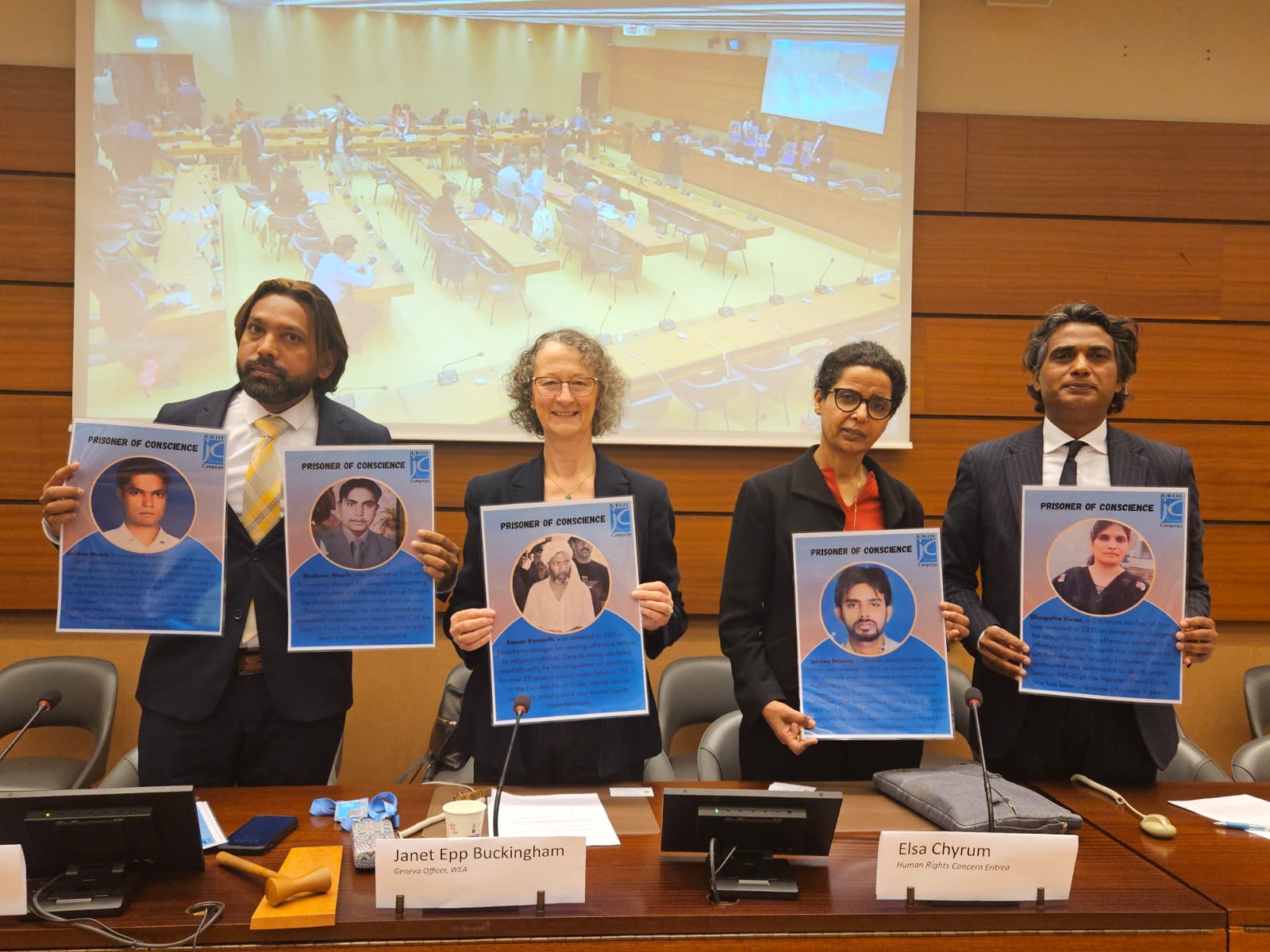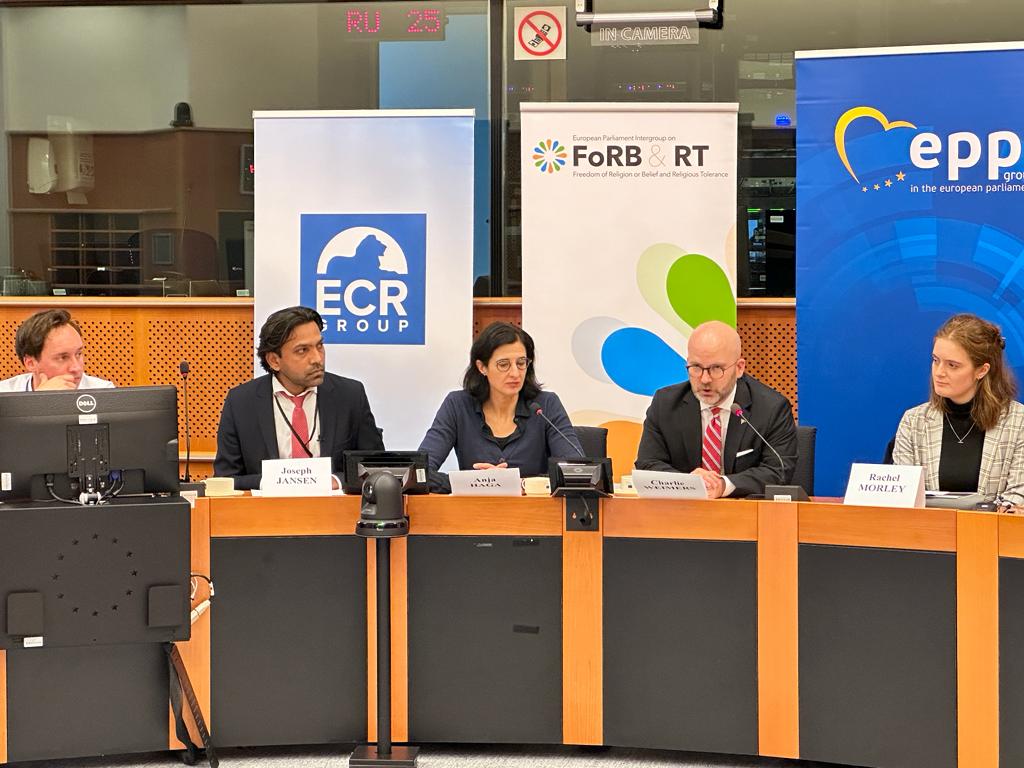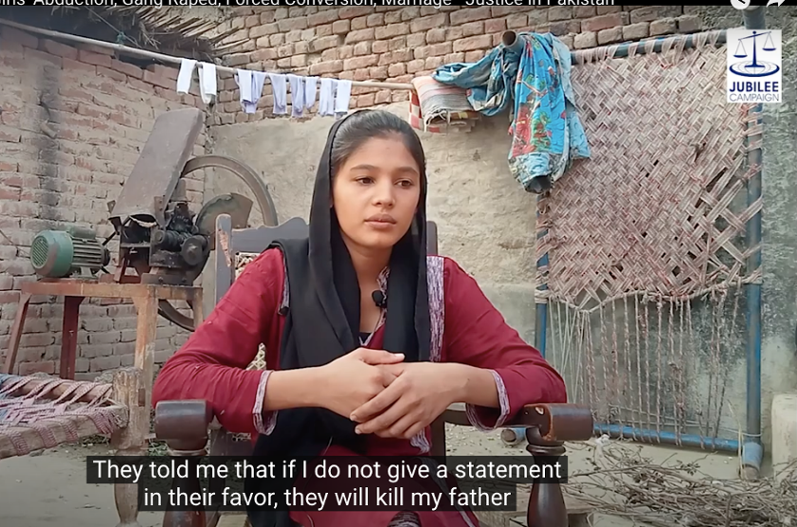Freedom of Religion or Belief & the Prohibition of Torture
Side Event at the 58th Regular Session of the United Nations Human Rights Council
Addressing Grave Human Rights Violations in Pakistan, Eritrea, Nicaragua, and Sudan
Hosted by: Jubilee Campaign US, co-hosted Set My People Free, and the European Centre for Law and Justice
11 March 2025 Geneva, A high-profile side event at the 58th Regular Session of the United Nations Human Rights Council has brought together human rights advocates, legal experts, and survivors of persecution to address the interconnection between religious freedom and torture in some of the most repressive regimes under focus, including Pakistan, Eritrea, Nicaragua, and Sudan.
The event, hosted by Jubilee Campaign US and co-hosted by Set My People Free and the European Centre for Law and Justice, highlighted how religious persecution often goes hand in hand with state-sanctioned torture, inhumane treatment, and systematic discrimination. Speakers underscored the urgent need for international intervention to hold perpetrators accountable and protect fundamental freedoms.
Nazila Ghanea, UN Special Rapporteur on Freedom of Religion or Belief
UN Special Rapporteur on Freedom of Religion or Belief, Nazila Ghanea, opened the discussion by emphasizing that freedom of religion and the prohibition of torture are non-derogable rights, yet violations persist. She noted that religious minorities around the world face targeted violence, destruction of places of worship, denial of religious rights in detention, and systemic marginalization.
“The recent A/HRC/58/49 report underscores the urgent need to strengthen collaboration between UN mechanisms, states, and civil society. We must push for stronger action, ensuring that states are held accountable for these grave human rights violations,” Ghanea stated.
Charlie Weimer, Member of the European Parliament
European Parliament Member Charlie Weimer called the persecution of Christians a moral crisis, criticizing Pakistan’s blasphemy laws, which are weaponized against minorities.
“Christians in Pakistan face mob violence, wrongful imprisonment, and forced conversions. The Jaranwala riots, where 26 churches were burned, showed that there is no justice for the Christian community,” Weimers said. He urged the European Union to take concrete action, conditioning trade, aid, and visas on real human rights reforms and imposing sanctions on violators.
Weimer also warned that religious persecution is spreading into Europe itself, with increasing attacks on churches and priests. “We cannot fight for religious freedom abroad while ignoring the crisis at home.”
Joseph Janssen: Persecution and Blasphemy Laws in Pakistan
Joseph Janssen, a minority rights activist, detailed the intersection between religious persecution and torture in Pakistan, where blasphemy accusations, forced conversions, and bonded labor fuel systematic oppression.
Pakistan’s blasphemy laws have led to wrongful imprisonments and mob lynchings. Victims suffer physical and psychological torture, often spending years in solitary confinement without evidence. Forced conversions of Christian and Hindu girls, abductions, and judicial bias leave families with little recourse for justice.
“These abuses demand urgent global attention. The international community must act now to protect minority rights, hold perpetrators accountable, and push for legal reforms,” Janssen declared.
Shahid Mobeen, Italian Roundtable on Religious Freedom
Shahid Mobeen, President of the Italian Roundtable on Religious Freedom, highlighted the dire state of religious freedom worldwide, with 307 million Christians persecuted globally.
“The murders of Shahbaz Bhatti and Salman Taseer illustrate the deadly consequences of defending religious freedom in Pakistan. Governments must counter radicalization, eliminate discriminatory laws, and enforce protections for religious minorities,” Mobeen urged.
He also criticized the European Union’s failure to fill the post of EU Envoy for Religious Freedom, stating that bold action—not just words—is needed to combat religious persecution.
Thibault van den Bossche, European Centre for Law and Justice: Nicaragua’s Christian Persecution
Thibault van den Bossche condemned Nicaragua’s escalating persecution of Christians, where the Ortega-Murillo regime has targeted the Catholic Church with arrests, exile, and church closures.
More than 5,600 Christian organizations have been dissolved, 5,000 religious processions banned, and 250 clergy members exiled. Clergy members face psychological and physical torture, including relentless interrogations, solitary confinement, and forced exile.
“These abuses constitute crimes against humanity under the Rome Statute. The international community must act decisively, impose sanctions, and increase diplomatic pressure on the Ortega regime,” van den Bossche asserted.
Elsa Chyrum, Human Rights Concern: Religious Persecution and Torture in Eritrea
Elsa Chyrum, Director of Human Rights Concern, addressed the grave human rights situation in Eritrea, where the government suppresses religious freedom and systematically tortures detainees.
Despite constitutional protections, only four religious groups are recognized, while Pentecostals, Jehovah’s Witnesses, and other Protestants are imprisoned, tortured, and even killed. Political prisoners, journalists, and military conscripts are subjected to extreme detention conditions, including confinement in metal shipping containers, starvation, beatings, electric shocks, and sexual violence.
“The UN has classified these acts as crimes against humanity, yet the Eritrean government blocks access to human rights monitors and silences opposition. The world must not look away—we need sustained international pressure to hold Eritrea accountable,” Chyrum declared.
Call to Action
The torture and persecution of religious minorities in Pakistan, Eritrea, Nicaragua, and Sudan must not go unanswered. The international community, including the United Nations and member states must:
- Increase UN human rights monitoring in high-risk countries.
- Ensure legal protections for religious communities and repeal oppressive laws.
- Impose targeted sanctions on officials responsible for religious persecution.
- Launch independent investigations to document crimes and hold perpetrators accountable.
- Pressure governments to repeal oppressive laws, including Pakistan’s blasphemy laws and Eritrea’s ban on non-sanctioned religious groups.
Religious persecution and torture are crimes against humanity. The international community must take decisive action now to protect victims, enforce justice, and restore religious freedom worldwide.





